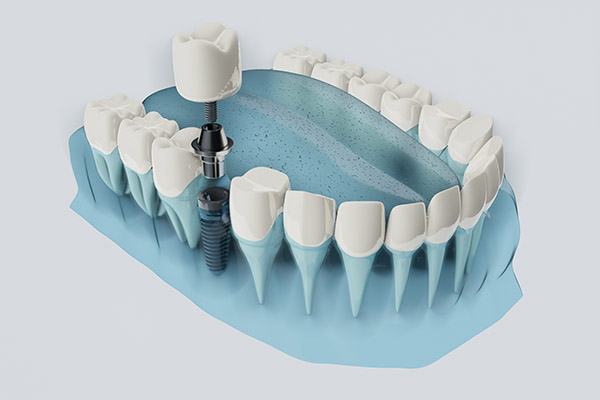Dental implant FAQs
Many patients are unsure of what implants are and how the procedure works. The following explores some of the most commonly asked questions and answers.
What are dental implants?
Dental implants are a surgical procedure that is used to replace multiple missing teeth. It is a permanent fix that provides a smile that is fully functional and looks natural. The treatment involves artificial tooth roots, usually composed of titanium, that are surgically placed into the jawbone.
Once the implant is placed, the process of osseointegration begins. This involves the fusion of the jawbone and the artificial root together and it typically takes around four to six months to complete. The fusion of the bone and root together gives a stable base for a new replacement tooth.
After osseointegration is complete, an abutment is attached to the root. Once it has been placed and the gums have healed, the new artificial tooth crown is positioned on top of the abutment.
How long is the recovery process?
Recovery time varies from patient to patient. There is usually some swelling and mild discomfort or pain for the first few days following the procedures that can be relieved with the use of pain medication. Patients can typically resume their normal diet a week after a treatment. Implants are often done using multiple procedures over the course of several months, so the full recovery time from all treatments may be six months or more.
What are the advantages?
Implants can provide patients with a beautiful and restored smile that is fully functional. The treatment prevents some of the serious complications that can occur from missing teeth, such as bone loss, shifting teeth, and a rapid change in the face’s appearance. Dental implants keep the teeth healthier and most closely mimic the function and appearance of natural teeth.
Patients with implants are also able to eat and speak normally. Unlike traditional dentures, dental implants result in secured false teeth that cannot slip out. Implants are typically a more comfortable option and patients usually are satisfied with the look and feel of the restoration, no longer feeling self-conscious about their appearance.
How long do implants last?
With proper dental care, implants can last for a patient’s lifetime. While dental implants cannot decay as natural teeth do, it is vitally important for the gums to stay healthy so the implants can remain in place. Keeping up with oral hygiene habits is crucial.
Conclusion
Dental implants are a treatment option for patients who have multiple missing teeth. This procedure helps teeth to become fully functional again and offers results that look natural. Good oral hygiene helps implants to last for a patient’s lifetime and provide a beautiful and healthier smile.
Request an appointment or call Cliffside Family Dentistry at 201-917-7977 for an appointment in our Cliffside Park office.
Related Posts
An implant crown is made of strong and safe materials to give the patient a reliable long-term replacement option for missing teeth. If you have questions about the materials used to make an implant crown, this review can help you understand what exactly each component is made of and why dentists use these particular materials.There…
Advancements in dental technology have revolutionized patient care, and one such innovation is the 3D dental scan. These 3D dental scans transform how dental professionals diagnose and treat oral health issues. Patients should know the importance of 3D dental scans, their impact on modern dentistry, and how they can positively affect their dental health.A 3D…
Standard dental implants can restore the function of missing teeth and preserve the jawbone. The three major components of implants closely mimic natural teeth and with proper care, these implants can last a lifetime, making them a popular choice among dentists and patients. Natural teeth are rigid, calcified structures that protrude past the gum line…
